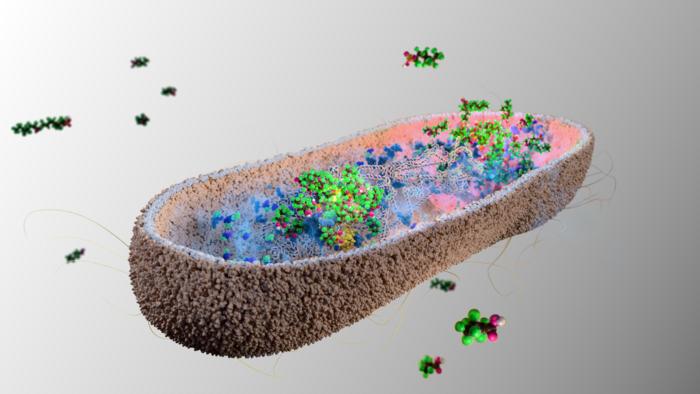In a groundbreaking development that could reshape our understanding of how the human body combats persistent environmental toxins, scientists from the University of Cambridge have uncovered a remarkable defensive mechanism within our own gut microbiome. This discovery centers on a group of bacterial species inhabiting the human digestive tract with an extraordinary ability to absorb and sequester per- and polyfluoroalkyl substances (PFAS), often referred to as ‘forever chemicals’ due to their notorious persistence in the environment and within our bodies. The study, published in Nature Microbiology, illuminates a promising biological pathway for mitigating the health risks posed by these ubiquitous toxic compounds.
PFAS represent a vast family of synthetic chemicals characterized by their robustness against degradation, allowing them to linger in ecosystems and accumulate in living organisms for decades or even centuries. Their widespread use spans everyday products such as waterproof clothing, non-stick cookware, cosmetics, and food packaging, prized for their resistance to water, oil, and heat. However, this durability comes at a steep cost to human health. Exposure to PFAS has been implicated in myriad adverse outcomes, including hormonal disruptions leading to decreased fertility, developmental challenges in offspring, increased susceptibility to certain cancers, and heightened risks of cardiovascular diseases.
Delving deep into this pressing health challenge, the Cambridge research team conducted meticulous experiments identifying a subset of human gut bacteria capable of bioaccumulating PFAS compounds. By introducing nine specific bacterial species into mice to mimic the human gut microbiome, researchers observed a rapid and significant absorption of PFAS ingested by these animals. Remarkably, within mere minutes, these microbes could sequester between 25% and 74% of the PFAS present, effectively removing them from the systemic circulation and facilitating their excretion via feces. This mechanistic insight fundamentally suggests that our gut bacteria might serve as a natural detoxification filter against these harmful substances.
The bacteria operate by aggregating PFAS molecules inside their cells into dense, protective clumps, a process hypothesized to insulate the microbes themselves from the toxic effects of PFAS. This biological containment not only underscores the resilience of these bacteria but also hints at the evolutionary interplay between humans and their microbiota in coping with environmental stressors. The researchers noted that as PFAS exposure intensifies, these microbes amplify their absorption activity, consistently maintaining a steady removal percentage regardless of concentration, a trait that could be harnessed for therapeutic purposes.
While the evidence to date stems from sophisticated mouse models that emulate human gut conditions, the extrapolation of these findings to humans remains the next critical frontier. Clinical data is forthcoming, but the implications are profound: enhancing populations of PFAS-absorbing bacteria in the human intestine could potentially decrease the body burden of these toxins, curbing their deleterious impact on health. This proposed mitigation strategy transcends traditional detoxification approaches, which have struggled due to PFAS’s chemical stability and resistance to breakdown.
The research team, spearheaded by Dr. Kiran Patil and Dr. Anna Lindell at the MRC Toxicology Unit within Cambridge, envisions a future where targeted probiotics could serve as an accessible and effective intervention. Such dietary supplements would be designed to bolster beneficial bacterial species with high PFAS affinity, essentially ‘turbocharging’ the gut’s natural defense system. These advances position microbial bioaccumulation as a novel frontier in the battle against environmental contaminants, with potential to revolutionize public health strategies.
Beyond medical interventions, the study serves as a clarion call to address PFAS exposure at both individual and societal levels. Given the omnipresence of PFAS—from contaminated water supplies to consumer products—risk reduction remains paramount. The researchers advocate practical measures such as avoiding PFAS-laden cookware and employing high-quality water filtration systems as immediate steps to curb intake, alongside long-term scientific solutions.
The urgency of PFAS pollution has not escaped policymakers either, with governments worldwide, including the UK, actively investigating regulatory frameworks to limit the production, usage, and environmental release of these chemicals. The UK’s parliamentary inquiry launched in April 2025 exemplifies growing recognition of PFAS’s pervasive threat and the pressing need to devise mitigation strategies informed by cutting-edge science.
Technically, PFAS molecules possess fluorinated carbon chains that resist common chemical degradation processes, resulting in their ‘forever’ designation. Some variants are rapidly cleared via renal pathways, but many longer-chain compounds bioaccumulate, embedding themselves within tissues and organs for years. This persistence complicates traditional detoxification and elevates chronic exposure risks. Understanding how natural gut flora can immobilize and safely export PFAS thus provides a pivotal insight into a previously underexplored biological defense mechanism.
The founding of Cambiotics, a startup emerging from this research collaboration, underscores the translational potential of these findings. Co-founded by Lindell, Patil, and entrepreneur Peter Holme Jensen, Cambiotics aims to harness these bacterial capabilities into market-ready probiotic therapies. Supported by Cambridge Enterprise, the company exemplifies academia-driven innovation addressing global health challenges.
In summary, while PFAS contamination poses an insidious and enduring health threat worldwide, this pioneering research illuminates the gut microbiome’s role as an unexpected ally. By bioaccumulating these stubborn toxins and facilitating their elimination, specific bacterial species offer a tentative but tantalizing biological solution. As the scientific community pursues human trials and probiotic development, individuals are encouraged to reduce their PFAS exposure where possible and remain hopeful about the imminent arrival of microbe-based therapeutics that could transform how we confront the legacy of ‘forever chemicals’.
Subject of Research: Animals
Article Title: Human gut bacteria bioaccumulate per- and polyfluoroalkyl substances
News Publication Date: 1-Jul-2025
Web References: https://doi.org/10.1038/s41564-025-02032-5
Image Credits: Peter Northrop / MRC Toxicology Unit
Keywords: PFAS, forever chemicals, gut microbiome, bioaccumulation, probiotics, environmental toxins, human health, microbial detoxification, perfluorononanoic acid, toxicology, environmental pollution




